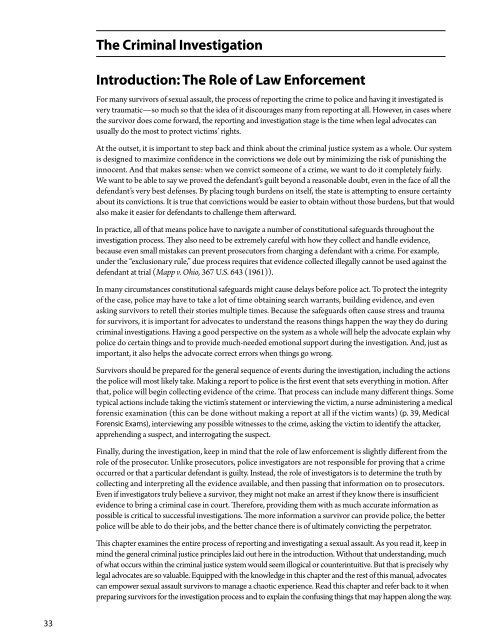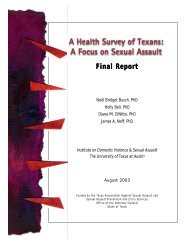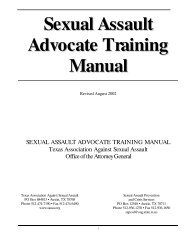Sexual aSSault LEGAL ADVOCACY MANUAL - Texas Association ...
Sexual aSSault LEGAL ADVOCACY MANUAL - Texas Association ...
Sexual aSSault LEGAL ADVOCACY MANUAL - Texas Association ...
You also want an ePaper? Increase the reach of your titles
YUMPU automatically turns print PDFs into web optimized ePapers that Google loves.
The Criminal Investigation<br />
Introduction: The Role of Law Enforcement<br />
For many survivors of sexual assault, the process of reporting the crime to police and having it investigated is<br />
very traumatic—so much so that the idea of it discourages many from reporting at all. However, in cases where<br />
the survivor does come forward, the reporting and investigation stage is the time when legal advocates can<br />
usually do the most to protect victims’ rights.<br />
At the outset, it is important to step back and think about the criminal justice system as a whole. Our system<br />
is designed to maximize confidence in the convictions we dole out by minimizing the risk of punishing the<br />
innocent. And that makes sense: when we convict someone of a crime, we want to do it completely fairly.<br />
We want to be able to say we proved the defendant’s guilt beyond a reasonable doubt, even in the face of all the<br />
defendant’s very best defenses. By placing tough burdens on itself, the state is attempting to ensure certainty<br />
about its convictions. It is true that convictions would be easier to obtain without those burdens, but that would<br />
also make it easier for defendants to challenge them afterward.<br />
In practice, all of that means police have to navigate a number of constitutional safeguards throughout the<br />
investigation process. They also need to be extremely careful with how they collect and handle evidence,<br />
because even small mistakes can prevent prosecutors from charging a defendant with a crime. For example,<br />
under the “exclusionary rule,” due process requires that evidence collected illegally cannot be used against the<br />
defendant at trial (Mapp v. Ohio, 367 U.S. 643 (1961)).<br />
In many circumstances constitutional safeguards might cause delays before police act. To protect the integrity<br />
of the case, police may have to take a lot of time obtaining search warrants, building evidence, and even<br />
asking survivors to retell their stories multiple times. Because the safeguards often cause stress and trauma<br />
for survivors, it is important for advocates to understand the reasons things happen the way they do during<br />
criminal investigations. Having a good perspective on the system as a whole will help the advocate explain why<br />
police do certain things and to provide much-needed emotional support during the investigation. And, just as<br />
important, it also helps the advocate correct errors when things go wrong.<br />
Survivors should be prepared for the general sequence of events during the investigation, including the actions<br />
the police will most likely take. Making a report to police is the first event that sets everything in motion. After<br />
that, police will begin collecting evidence of the crime. That process can include many different things. Some<br />
typical actions include taking the victim’s statement or interviewing the victim, a nurse administering a medical<br />
forensic examination (this can be done without making a report at all if the victim wants) (p. 39, Medical<br />
Forensic Exams), interviewing any possible witnesses to the crime, asking the victim to identify the attacker,<br />
apprehending a suspect, and interrogating the suspect.<br />
Finally, during the investigation, keep in mind that the role of law enforcement is slightly different from the<br />
role of the prosecutor. Unlike prosecutors, police investigators are not responsible for proving that a crime<br />
occurred or that a particular defendant is guilty. Instead, the role of investigators is to determine the truth by<br />
collecting and interpreting all the evidence available, and then passing that information on to prosecutors.<br />
Even if investigators truly believe a survivor, they might not make an arrest if they know there is insufficient<br />
evidence to bring a criminal case in court. Therefore, providing them with as much accurate information as<br />
possible is critical to successful investigations. The more information a survivor can provide police, the better<br />
police will be able to do their jobs, and the better chance there is of ultimately convicting the perpetrator.<br />
This chapter examines the entire process of reporting and investigating a sexual assault. As you read it, keep in<br />
mind the general criminal justice principles laid out here in the introduction. Without that understanding, much<br />
of what occurs within the criminal justice system would seem illogical or counterintuitive. But that is precisely why<br />
legal advocates are so valuable. Equipped with the knowledge in this chapter and the rest of this manual, advocates<br />
can empower sexual assault survivors to manage a chaotic experience. Read this chapter and refer back to it when<br />
preparing survivors for the investigation process and to explain the confusing things that may happen along the way.<br />
33
















